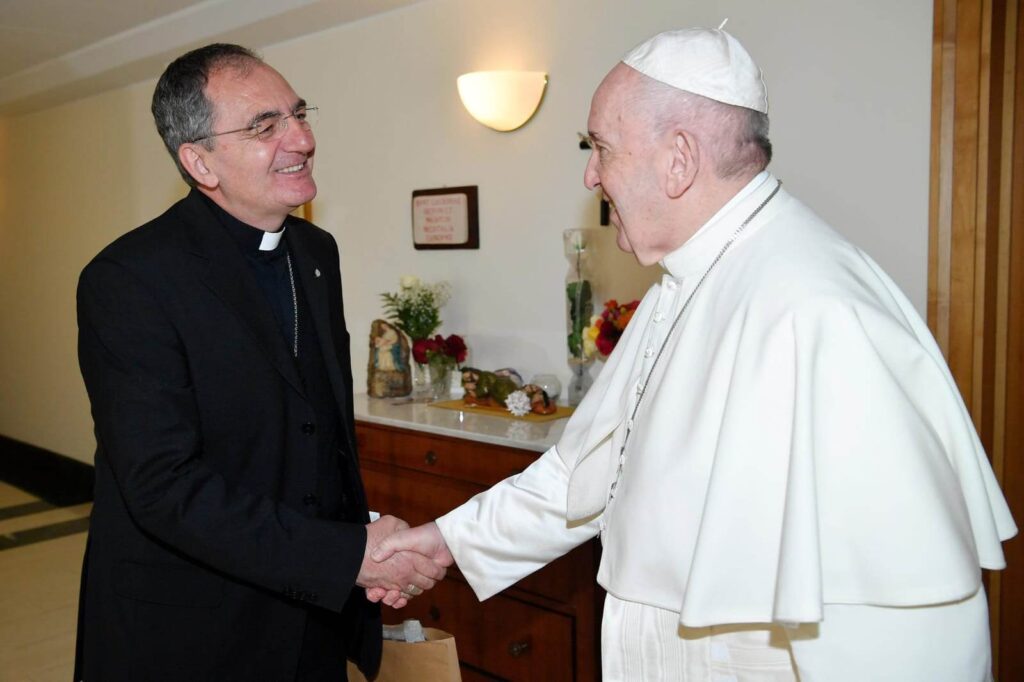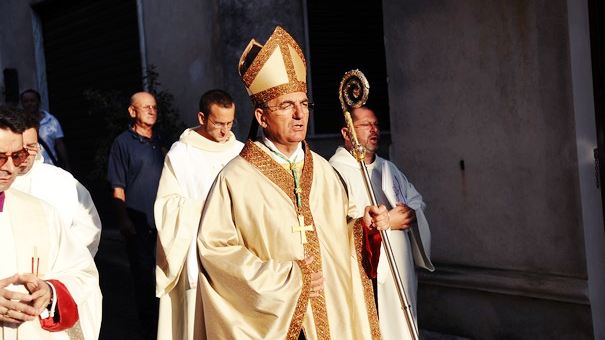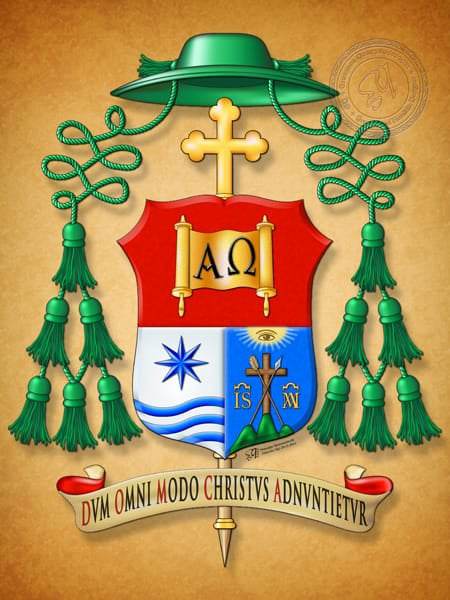The jubilee of the episcopal ministry of Fr. Antonio De Luca CSsR is an opportunity to summarize ten years of pastoral and teaching work of our confrere in the diocese of Teggiano-Policastro in Italy. The authors of an occasional book published on the occasion of the jubilee. Father Vincenzo La Mendola introduces the contents of the publication in an article sent to Scala News.
Diocese of Teggiano-Policastro, On the 10th anniversary of the episcopal consecration of Father Antonio De Luca (2012-2022). Speeches, reflections, and perspectives starting from the episcopal teaching of Father Antonio De Luca C. Ss. R., Edizioni Diocesi Teggiano-Policastro, Teggiano (SA) 2022, pp. 288.
It is really with great pleasure and interest that we present this volume consisting of a rich collection of essays/studies, centered around the episcopal magisterium of bishop Father Antonio De Luca (Torre del Greco NA, 1. 07. 1956) and his pastoral activity in the Church of Teggiano Policastro, for a decade now, sufficient time to draw up an initial balance sheet and to highlight the direction and style of his ministry as pastor of the People of God.
It was January 7, 2012, the day on which Fr. Antonio was ordained bishop in the cathedral of Naples. The news of his election had unanimously aroused the joy of the Redemptorist confreres, of many priests, men, and women religious and lay people who benefited from his rich priestly ministry, expressed in various positions and responsibilities ad intra in the Congregation of the Redemptorists, ad extra in the diocese of Naples and in others of southern Italy.
The following 4 February Father Antonio entered the Diocese of Teggiano-Policastro, starting his pastoral service among the people of Cilento, a land rich in cultural and religious traditions, geographically located in one of the Italian suburbs, a privileged place for a bishop who carries in his DNA the missionary gene of Saint Alphonsus.
Ten years have passed since those events which indelibly marked the history of the particular Church to which he was sent and the Neapolitan one from which he comes. The chronological arc just mentioned reminds us of the duty to remember, that is to remember in order to see God and recognize his marvels already on this earth, in history, in the midst of women and men of the present and of the past (Invitation to read by Carmine Matarazzo, pp.11-15). Not a simple commemoration therefore but a starting point for a more realistic and hopeful look at the future. The Apparition of the Risen One on Lake Tiberias in mosaic reproduced on the cover, as well as evoking the fruitfulness of the Redemptorist Bishop’s episcopal ministry, it refers to the attention and aesthetic taste with which the graphic layout was designed, a joy for the reader’s hands and eyes.
The volume, edited by Giuseppe Radesca and Enzo Rispi, and coordinated in its themes by Carmine Matarazzo, as can be seen from the introductory part and the conclusions, is divided into two sections and collects interventions that re-read, from different angles, the ministry episcopal teaching of Father Antonio, in the light of his magisterial production and related pastoral approach. An appropriate initial biographical note allows the reader to have a panoramic picture of the many activities and numerous offices of Fr. Antonio, prior to his episcopate.
The Essential Bibliography (on pp. 7-9) which covers the period 2012-2022, offers a list of Father De Luca’s Pastoral Orientations, materialized in the drafting and printing of 10 elegant volumes, from which it is possible to grasp the teachings, the programmatic lines of his government and his pastoral vision. The Guidelines refer to his theological thought, strongly anchored to the theological virtues, to mercy, announced and celebrated, and to the theme of synodality whose form and action are highlighted. A separate mention deserves the Letter to families, on the occasion of Easter 2012. The fluid style and the dense content of the texts, designed and written to reach everyone, give us the figure of the popular cut, intentionally adopted by the Redemptorist Bishop, caught in the interaction with the concrete experience of his Church.
The text in question is representative of this ecclesial journey and of the “Mediterranean ecclesiological vision” of Fr. DeLuca.
The introductory reflection, which serves as a background soundtrack to the following contributions, features an original intervention by Antonio Di Donna, The profile of the bishop according to S. Alfonso M. de’ Liguori, an interesting reinterpretation in a contemporary key of the Reflections useful to Bishops, work, perhaps less known, but no less important, among those of Saint Alphonsus.
The first part is to walk together… Speeches and reflections are the most substantial and consist of fourteen contributions, donated to Fr. Antonio from friends, colleagues, collaborators, and admirers. The biographical notes of the authors (pp. 279-28), give us the figure of the scientific depth of the various contributions. They are listed below, in the order in which they appear in the book.
- Orazio Francesco Piazza, « Signum fraterni vinculi cordium », Dialogue and episcopal fraternity (pp. 25-37).
- Giuseppe Radesca, Evangelization and synodality. The pastoral itinerary of Fr. Antonio De Luca (pp. 39-51).
- Lorenzo Gasparro, Casting the nets on the Word. The Word of God animates every pastoral path (54-63).
- Romulus Barbarulo, Accipe anulum. The Bishop participates in the spousal nature of Christ (pp. 65-78).
- Antonio Romaniello, The missionary ministry of Fr. Antonio De Luca for an authentic spirituality (pp. 79-89).
- Martino De Pasquale, Proximity and synodality (pp. 91-100).
- Antonio Costantino, Integration and culture of inclusion (pp. 101-110).
- Arturo Esposito, Reception (pp. 111-114).
- Antonio Calandriello, The craftsmanship of communion in the episcopal magisterium of Fr. Antonio De Luca (pp.115-127).
- Giuseppe Puppo, Family and fragility. Juridical-pastoral approach to the family (129-141).
- Domenico Santangelo, The binomial faith and sequela Christi: form for the good life in the world (pp. 143-153).
- Angelo Paladino – Antonio Cetrangolo, Law and charity. A reflection starting from the life of Saint Alphonsus (pp. 155-166).
- Enzo Rispi, For an apostolic spirituality. The copious redemptio (pp. 167-184).
- Massimo La Corte, The audacity of hope and the strength of patience (pp.185-204).
The second part, On the way to the mission – Balance and perspectives, consists of three interventions: a broad and articulated conclusion, in which, masterfully, the magisterial contributions of the Pastor of the Church in Teggiano are stitched together and re-read in an overall vision, focusing attention on the documents offered annually by the Bishop as stimuli and guides to the diocesan community, with the intention of showing the goal, fully accepting the challenge of synodality.
- Carmine Matarazzo, From the pastoral care of conservation to a synodal Church in permanent conversion. The missionary style of the episcopal magisterium of Father Antonio De Luca.
- The Episcopal Coat of Arms of Father Antonio De Luca (pp. 207-270).
- Dum omni modo Christus adnuntietue. Text and music by Angelo Fiasco (pp. 275-278).
It is sufficient to scroll through the titles of the various interventions (for the subtitles refer to the index of the book), to realize the fruitfulness and wealth of contents and initiatives which have marked the path of the local Church, led by Father De Luca, in the ten recent years, in full consonance with the lines of the Church, expressed in the magisterium of the current Pontiff and of the CEI, but with a personal imprint, linked to one’s own formation and ecclesial experience and to the charism lived within the Redemptorist Congregation, with a constant look at the missio ad gentes and at the socio-cultural conditions and challenges of the south.
Fr. Antonio, in the footsteps of Saint Alphonsus, stands as a man of the people, attentive to the social, cultural, and historical needs of the territory, and visited personally and frequently, with a missionary style. In fact, his pastoral action begins “from below”, that is, from listening, from personal encounters and open discussions with the people, from knowledge of the territory, in the everyday life. It is known that the Bishop is present at all the religious, cultural, and popular initiatives and events of the various centers of his Diocese, establishing personal relationships with every category of people and dialoguing with the institutions.
Within the presbyterate, as can be deduced from the texts mentioned, he acts as a craftsman of communion, promoting the pastoral care of vocations, the growth at various levels of the presbyters and personally supervising their formation. Recurring terms such as episcopal fraternity, welcome, integration and inclusion, habitual in his way of expressing himself, offer us the human and pastoral coordinates of the episcopal mission of Father Antonio, careful to build a style of synodal Church, listening, which takes into account the traditions, and which courageously projects itself on the paths of history, open to a serious confrontation with the contemporary world.

De Luca’s episcopate, summarized in the Pauline (and consequently Alphonsian!) motto Dum omni modo Chrtistus adnuntietur ( Phil:1,18), also illustrated in its heraldic components (pp. 271-2674) within the text, is placed among the priority objectives that of guiding the local Church in the assimilation and actualization of Vatican II, a complex and indispensable operation still in progress, which requires a careful spiritual accompaniment, in which theological-pastoral stimuli are offered and a change is favored church-minded.
The book, edited with competence, in all its aspects, is only the first part of the journey just traveled, and constitutes the premise for a new pastoral itinerary, which we are sure will be equally fruitful and incisive.
We wish our brother bishop that, following the example of Saint Alphonsus, his work may continue to be “lucerna ardens et lucens” for all people, communities, and society.
Vincenzo La Mendola C.Ss.R.








